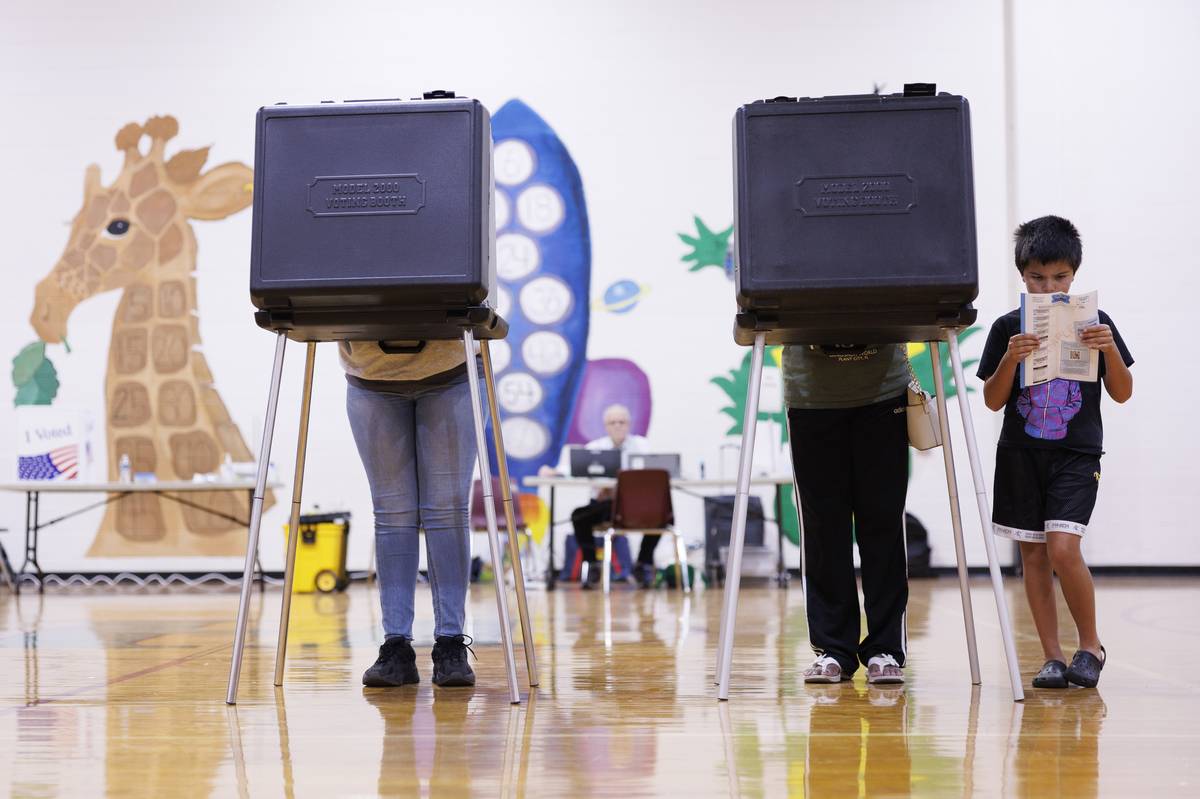
Kiran Kilpatrick, 9, waits while his mom votes in Pittsboro, North Carolina, on Nov. 5.
17:19 JST, November 10, 2024
Americans told the Democratic Party this week that the economy, even beyond inflation, isn’t working for them, thrusting party leaders into a scramble for a new economic strategy that can reverse the losses of working-class voters.
The country’s decisive swing toward President-elect Donald Trump reflects not just dissatisfaction with the recent run-up in prices but also deeper fears about slipping financial security. Americans are saving less than they were before the pandemic, and they are falling increasingly delinquent on car loans and credit cards at rates not seen since the aftermath of the Great Recession.
Three in 10 voters said they were “falling behind” financially, a 50 percent increase from 2020, according to AP VoteCast. Meanwhile, 8 in 10 said they hoped for “substantial change or complete and total upheaval” in how the country is run.
That growing divide is prompting soul-searching among Democratic leaders, in the aftermath of the 2024 presidential election. Within days, factions of the Democratic Party have blamed their internal rivals for Tuesday’s results, offering a range of conflicting explanations for the party’s poor economic ratings among voters.
Faced with the stark prospect of being shut out of the White House and both bodies of Congress, Democrats are pushing different – and incompatible – visions for reversing one of their worst electoral performances in years.
“The insistence of a lot of Democratic economic spokesmen on inflation – ‘keep on walking, there’s nothing to see here’ – was not useful,” said Bill Galston, who served as a senior policy aide in the Clinton administration. “I always believed Biden would have been better served by an early and frank acknowledgment that they got it wrong.”
More centrist voices in the party have since Tuesday revived their criticisms of President Joe Biden’s 2021 stimulus plan, arguing it exacerbated inflation and hurt Vice President Kamala Harris even after Biden bowed out of the race. On the left, lawmakers and strategists faulted Biden for not more aggressively highlighting corporate price-gouging, and Harris for what they characterized as her move away from economic populism and embrace of billionaires such as Mark Cuban.
Some progressive lawmakers such as Sen. Bernie Sanders (I-Vermont) argued that Democrats should have been more focused on economically populist messages, such as expanding Medicare benefits and raising the minimum wage, while publicly identifying the villains, such as Wall Street and the richest Americans. Harris’s campaign did propose some aggressive policy plans, but liberal critics have said these policies were insufficient or diluted in her public communications.
“We tried hard to do this – to have this campaign focus or emphasize an economic agenda that speaks to the need of the working class in this country,” said Sanders, who also extolled Harris’s campaign and applauded her messages on abortion, democracy and Trump’s unfitness for office. “The status quo is working very, very well for the people on top but it’s not working well for working people, and the Democratic Party has become far too much a defender of the status quo. … You have to acknowledge the pain and the reality of people’s lives, or people will say, ‘Screw you.’”
White House and campaign officials have expressed exasperation with the criticisms of their policy and messaging efforts.
“We always made a point of recognizing the profound struggle that families were facing with high prices. I don’t think you can find a presidential statement that ignored that reality,” said Jared Bernstein, the chair of the White House Council of Economic Advisers.
Bernstein added: “I’m sure we were far from perfect. But I’m also sure there’s not some secret combination of words that had we said them, the outcome would’ve been different.”
At stake is the loss of longtime Democrats such as Kevin Prag, of Las Vegas, who voted for Trump because his money doesn’t go as far as it used to at the grocery store and he worries that higher taxes would leave him with even less spending power. The 48-year-old said he also liked Trump’s plans to bring down costs by drilling more oil and cutting regulations for businesses.
“The way I look at it, Democrats are on a sinking ship,” said Prag, who creates finance videos on YouTube. “Instead of saying, ‘We need to look for the leak, we need to fix the problem’ – which is wealth generation, good jobs, being able to buy a house – they decide, ‘We need to go after price-gouging.’ What does that even mean? It’s like they’re totally missing the issue.”
Although many parts of the economy appear strong on paper – with ample jobs, rising wages and falling inflation – a rapid run-up in prices has pushed up the costs of housing, groceries and gas by more than 20 percent in four years. Those higher costs have not just strained Americans’ immediate budgets but have also altered their views of long-term stability. Consumer confidence, a measure of how Americans feel about the economy as well as future prospects, remains markedly below pre-pandemic levels.
“It’s a longer, structural problem than just a few years of inflation,” said Susan Hyde, a political science professor at the University of California at Berkeley who studies elections and democracy. “When people are worried about their own positions in the economy, that can be extremely consequential for voting behavior.”
Exit polls suggest that roughly 70 percent of voters regarded the economy as “poor” or “not good,” creating a clear headwind for Harris. Of the voters who rated the economy negatively, a majority – 68 percent – voted for Trump.
“I’m making more than I ever have, and yet money is always tight,” said Sara Davison, a divorce attorney in Carlsbad, California, who voted for Trump for a second time. “As much as I’d like to put money aside, there are very few deposits going into my savings account.”
As a presidential candidate, Harris did more than Biden to recognize voters’ frustrations and promise large-scale fixes. But her economic messaging contained other contradictions. While she embraced populist rhetoric on cracking down on corporate price-gouging and billionaires, Harris simultaneously tried casting herself as a pro-business moderate with a lighter regulatory touch than Biden.
From Election Day, it was clear that voters were confused about Harris’s economic policy priorities, said Celinda Lake, a longtime Democratic pollster. Her background as a California Democrat also raised suspicions among Midwestern voters about her intentions on trade policy, Lake said, even as she promised to maintain Biden’s approach.
“Everybody knows what Trump economics is – China, tariffs, tax cuts,” Lake said. “Then you go to them and ask, ‘What are Democratic economics?’ and someone will make a joke about welfare and half the people can’t name anything. It’s nothing like the Republican brand.”
Still, others say there wasn’t much Biden or Harris could have done to change Americans’ minds about the economy. Leaders in many countries – including Britain, Japan and New Zealand – have been voted out this year, in large part because of inflation-related discontent. And although the United States has avoided a long-feared recession, many say they are frustrated that economic milestones such as buying a house or having children appear to be falling further out of reach.
In Buffalo, Stephen Graser works two jobs – at a fast-food joint and as a wrestling coach – but at 32, he still lives with his parents. He voted for Trump, just like he did in the past two presidential elections, in hopes that the candidate will eliminate taxes on tips and overtime.
“I can’t afford my own place, even with two jobs,” he said. “Things are much harder than they used to be.”
Biden administration allies have long debated how much to talk about the pain of higher inflation over the years. One of the fiercest debates has centered on whether Democrats did too much to try to convince voters that the economy was in good shape when polling suggested they were furious about inflation. Jeffrey Sonnenfeld, a Yale University professor who leads the Chief Executive Leadership Institute, said he exchanged dozens of emails with Biden and Harris officials urging them to “stop apologizing for success and caving to Trump propaganda on the economy.”
“They said the public can’t understand the truth and that they couldn’t explain it to them either,” Sonnenfeld said of campaign officials. But the campaign’s flaw, he said, was that Democrats “never presented the extraordinary pattern of perhaps the strongest economy in American history.”
But others now say the White House did too much to stress positive economic data.
Those concerns continued even after the Federal Reserve began taking aggressive steps to bring down inflation, by hiking interest rates to their highest level in more than a decade.
The White House consistently struggled with messaging good news amid the worst inflation in a generation, with top officials offering different strategies. Former White House chief of staff Ron Klain had wanted Biden to publicly recognize those difficulties by stating that higher interest rates were hurting the public, according to two people with knowledge of the matter, who spoke on the condition of anonymity to reflect private conversations.
Klain’s suggestion was met with resistance. Administration officials were wary of even implicitly criticizing the Federal Reserve, preferring to adhere to the long-standing principle of deferring to the central bank’s independence.
Bernstein, the White House economist, expressed confidence that Biden’s economic record will look better with time.
“Obviously, as we’ve seen in elections across the globe, inflation played a big outcome,” he said. “But any analysis that minimizes the lasting impact of the president’s investments in communities and on our broader economy are woefully incomplete.”
"News Services" POPULAR ARTICLE
-

American Playwright Jeremy O. Harris Arrested in Japan on Alleged Drug Smuggling
-

Japan’s Nikkei Stock Average as JGB Yields, Yen Rise on Rate-Hike Bets
-

Japan’s Nikkei Stock Average Licks Wounds after Selloff Sparked by BOJ Hike Bets (UPDATE 1)
-

Japanese Bond Yields Zoom, Stocks Slide as Rate Hike Looms
-

Japan’s Nikkei Stock Average Buoyed by Stable Yen; SoftBank’s Slide Caps Gains (UPDATE 1)
JN ACCESS RANKING
-

Keidanren Chairman Yoshinobu Tsutsui Visits Kashiwazaki-Kariwa Nuclear Power Plant; Inspects New Emergency Safety System
-

Imports of Rare Earths from China Facing Delays, May Be Caused by Deterioration of Japan-China Relations
-

University of Tokyo Professor Discusses Japanese Economic Security in Interview Ahead of Forum
-

Japan Pulls out of Vietnam Nuclear Project, Complicating Hanoi’s Power Plans
-

Govt Aims to Expand NISA Program Lineup, Abolish Age Restriction





















